Berks County’s five local colleges and universities have A LOT to offer – and that includes some unique and exceptional major programs. Learn about a few highlights here.
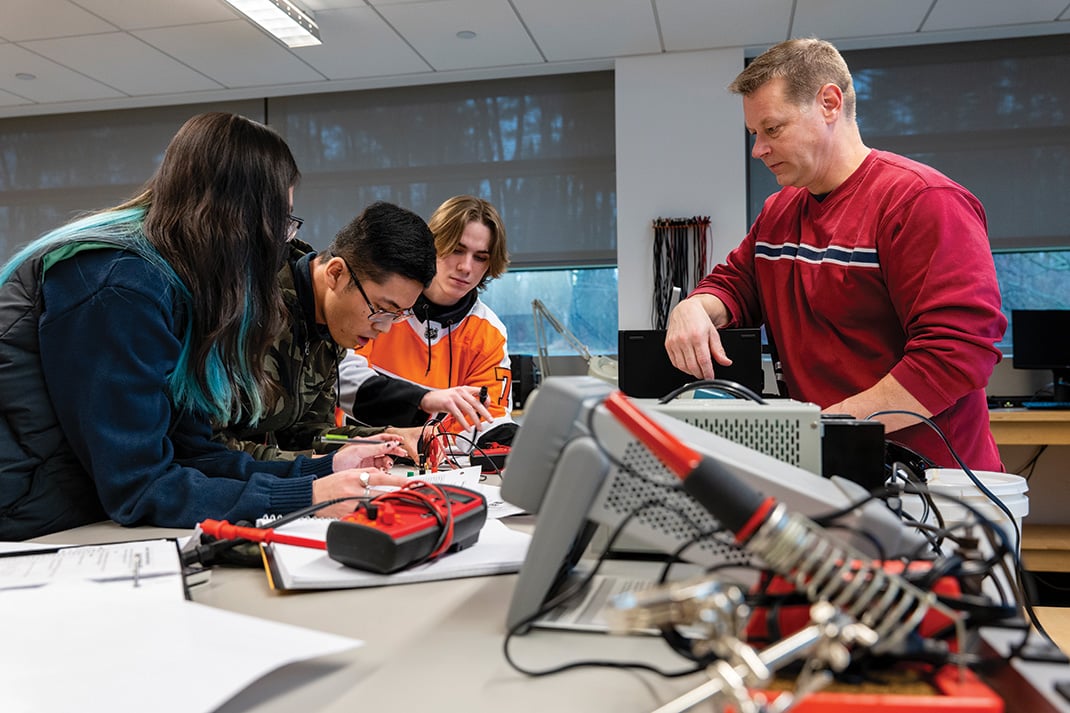
Penn State Berks Leads the Way in Engineering Degree Programs
Penn State Berks has a long and renowned history of providing engineering education in Berks County, dating back to 1927. Today, Penn State Berks is the only institution of higher education in the county to offer not one but two accredited engineering baccalaureate degrees, and both degrees can be completed in their entirety on campus. Electro-Mechanical Engineering Technology and Mechanical Engineering are both accredited by the Accreditation Board for Engineering and Technology (ABET), the global leader in accreditation of engineering, engineering technology and related programs. ABET accreditation is recognized by employers worldwide.
The B.S. in Electro-Mechanical Engineering Technology program is offered in response to a growing demand from industrial and consulting companies for engineers with a wide range of technical knowledge. The interdisciplinary training, along with in-depth study of modern instrumentation, process control and quality control concepts, gives students the broad range of skills that are needed in today’s workforce.
Mechanical Engineering is one of the largest and broadest engineering disciplines, involving the study of mechanics, fluid/thermal systems and system dynamics. The B.S. in Mechanical Engineering program includes both a strong design emphasis and hands-on laboratory experience. Students learn to use scientific and engineering methods to devise useful products that are safe, reliable and cost-effective.
Both degrees are housed in the college’s Gaige Technology and Business Innovation Building, which includes the latest state-of-the-art technology and laboratory space. The facility also includes a Fluid Discovery Lab created by an engineering professor with her research students. The result is the only open water channel research facility within the entire Penn State University system.
Students have a world of opportunities, from conducting research alongside faculty members to working on multidisciplinary design projects sponsored by local companies through the Berks Learning Factory.
Penn State Berks engineering degrees are further enhanced by partnerships with local business and industry. These industry partners attend college career fairs, participate in research projects, serve on advisory boards and hire engineering students as interns and employees.
Students complete hundreds of internships, and many establish their careers in the Greater Reading area. For those who choose to leave Berks County, they find that a Penn State degree is recognized worldwide.
With a commitment to making the dream of earning an engineering degree attainable for all students, Penn State Berks offers the LION STEM Scholars program, which provides support in the form of scholarships to qualified engineering students with demonstrated financial need. The college also offers the Engineering Ahead program, a four-week summer bridge program to increase retention rates among a diverse group of students by enhancing their academic preparedness.
In addition, Penn State offers more than a dozen undergraduate engineering majors at University Park — along with additional options at other Penn State campuses — providing students with rich educational possibilities to lay the groundwork for lifetime career success.
Penn State Berks is providing the big university degree close to home and preparing the engineering students of today for the in-demand careers of tomorrow.
For more info visit berks.psu.edu.
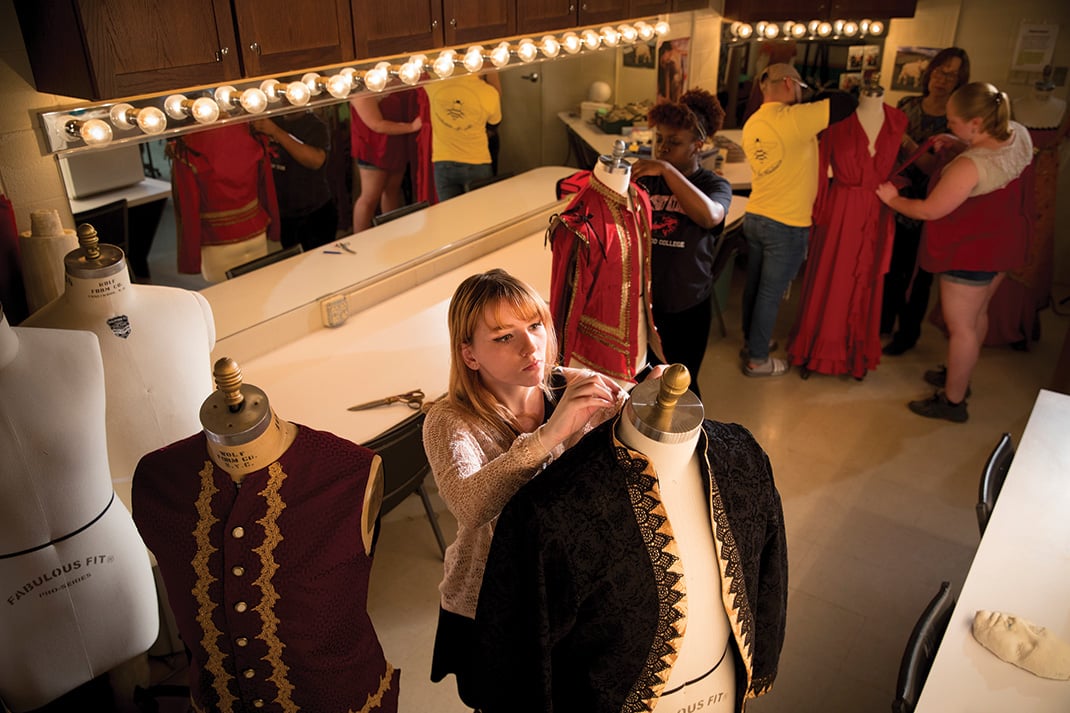
Albright College Fashion Prepares Graduates for A Multibillion-Dollar Industry
Each year, bright, dazzling contemporary styles compete with swimsuits and gothic ballroom gowns as media spotlights shine on New York Fashion Week runways. And Albright College fashion students and alumni are there.
Planning for the college’s main Fifth Avenue event, about 50 students stand backstage for the first time — among racks of carefully hung dresses, rows of hair and makeup stations and industry professionals, taking direction from fashion event expert Scott French, Albright class of 1985.
Jonathan Otero, class of 2020, is ecstatic. His designs will be shown to international media this evening alongside the work of several other Albright alumni and students.
“We’re trying to stay calm right now because of the rush and everything — it doesn’t feel real,” he says. “This is everything we worked for in undergrad, just dreaming and hoping and wishing that one day we’re showing at New York Fashion Week — and we’re here. So, this is it.”
Meanwhile, Sarah Kim, class of 2024, is finishing strong at Albright, where she has continued to nurture her passion for garment formation and theatrical costumes. For Kim, the New York Fashion Week showcase is akin to a live portfolio, accentuated with bright overhead lights and upbeat music.
“It’s really exciting to see the things that you’ve spent a large portion of your year creating as a final product, all together,” she says.
Albright’s award-winning fashion program prepares students for a wide range of careers in a multifaceted, multibillion-dollar industry. As a result, its graduates work around the world as designers, celebrity stylists, influencers, production executives and more. Their employers include the likes of Ralph Lauren, Calvin Klein and Swarovski, to name a few. Many have gone on to start their own thriving businesses.
At Albright, students are immersed in fashion from the very first day, working side by side with faculty mentors.
“Our professors at Albright are all so amazing, and they have a lot to give,” says Olivia Connor, class of 2018.
In addition to separate programs in costume design, design and merchandising, fashion design and fashion merchandising, students also take advantage of Albright’s co-major program, combining fashion with another area of study such as business, computer science, communications — even environmental studies.
In fact, nearly half of Albright students take advantage of the college’s distinctive co-major programs which enable students to cross or combine different programs without taking longer to graduate.
Between strong academics and its proud designation as the sole undergraduate college whose students and alumni unveiled designs on New York Fashion Week runways over the last two years, Albright has earned recent accolades. The college has earned a top fashion design school ranking by Fashion-Schools.org (#27 nationally) and a top three placement for Pennsylvania fashion design schools by College Factual.
Be sure to follow along as more Albright student and alumni designs are slated to hit the 2023 New York Fashion Week runway this September.
For more info visit albright.edu.
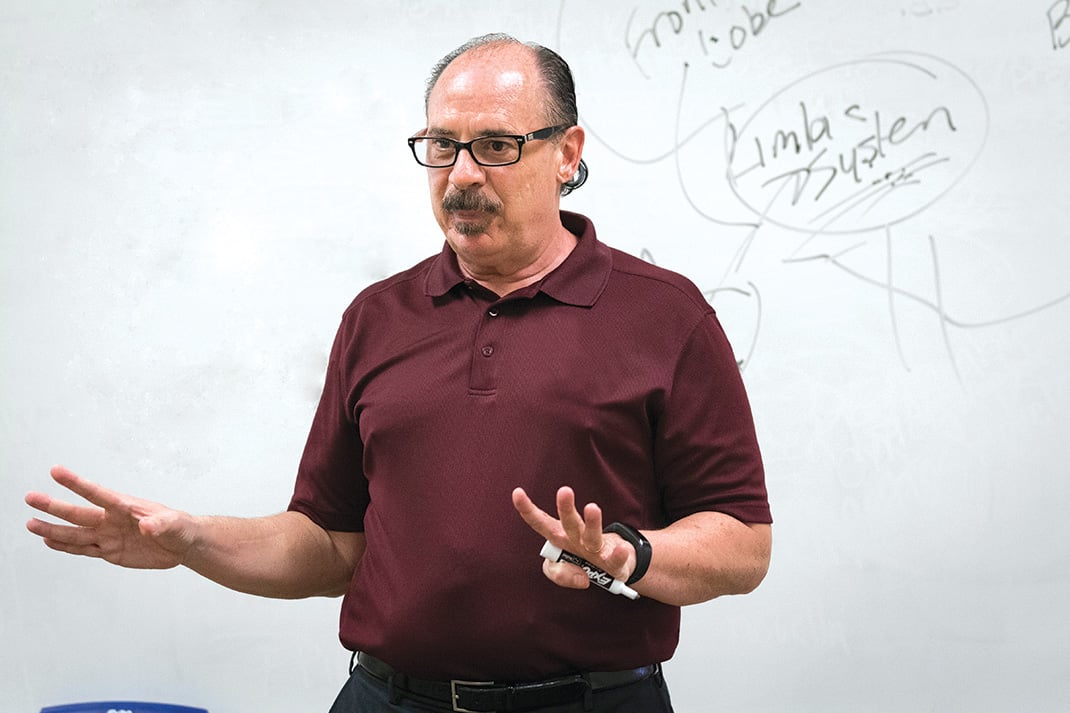
Alvernia University Advancing Addictions & Mental Health Counseling
Among Alvernia University’s many well-known and respected majors, its groundbreaking Addictions and Mental Health Treatment (AMHT) program remains a standout.
Initiated more than 45 years ago as the first of its kind in the nation, when addiction was narrowly understood and treatment hard to come by, the program has turned out thousands of counselors and addiction specialists who work in treatment centers and other facilities across the country.
Addiction is not a stagnant field but one that must constantly change to address increasingly complex challenges facing patients, their families and providers. Alvernia’s program staff work hard to keep the curriculum current with industry standards.
“We’ve evolved as problems regarding addiction have evolved,” says program director David Reyher, M.S., CAADC.
Another factor in the program’s success is that it was developed by people actively working in the field, and it continues to utilize professors and staff members with hands-on experience in treatment centers and other facilities.
Thirdly, Reyher says, the program is based on Alvernia’s Franciscan core values, which have supported the work of its directors, faculty and staff.
“That commitment has remained paramount for over 40 years,” he says.
The AMHT program was founded in 1976 at the urging of the late Sister M. Pacelli Staskiel, OSF.
“It was one of our earlier programs, and it remains consistent and aligned with our mission of supporting the community,” notes Dr. Elizabeth Matteo, dean of the College of Humanities, Education and Social Sciences.
George Vogel, the addiction program’s longtime director who preceded Reyher, recognized the need for a master’s-level program that would enable students to build on their undergraduate work and further advance in the field of mental health.
Alvernia’s Master of Arts in Clinical Counseling (MACC) degree was launched in 2002, supporting the highest standards in professional mental health and addictions treatment.
“The MACC program has quite a few current students and grads who have come through the AMHT program,” notes Nicole Hall, MACC program director. “The curriculums line up nicely, with one really building on the other.”
Stephanie Berlin, who received a bachelor’s degree in addictions and mental health treatment in 2018 and a master’s degree in clinical counseling in 2021, says the internships she completed with Caron Treatment Centers as part of her undergraduate work helped her narrow her career goals and prepare her for the MACC program.
“The AMH program provided insight, education and clarification to make informed decisions around the path I would pursue moving forward,” Berlin says. “The programs fit together to give me the education and real-world experience that helped me prepare for my future.”
Partnerships with Caron, the Council on Chemical Abuse and other agencies place Alvernia’s programs and students at the center of the Berks County community.
Maria Figurelli, who graduated from the AMHT program in 2021 and expects to earn a degree from the MACC program in 2024, is looking forward to an upcoming internship with Everlasting Wellness, an agency specializing in perinatal mental health.
“I’m glad we’re able to choose our own placements,” says Figurelli, who eventually would like to start her own practice. “They’ve given me a lot of experience and are helping me focus on a career path.”
For more info visit alvernia.edu.
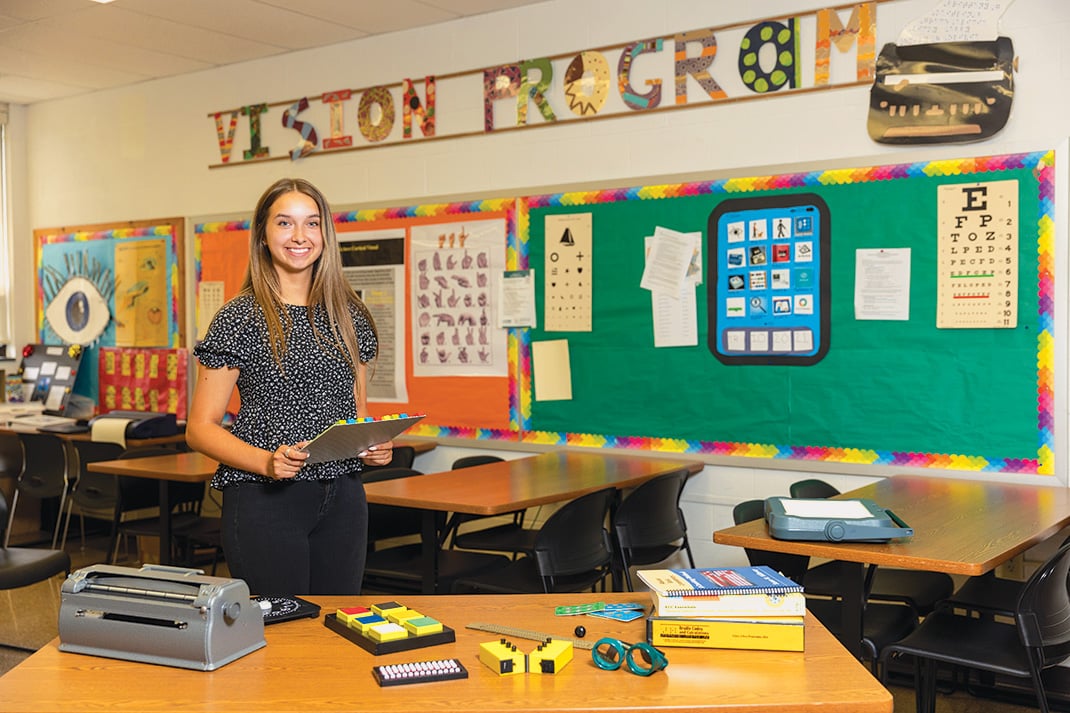
Kutztown University Special Education/Vision Impairment Major Sees 100% Job Placement Rate
The special education/visual impairment major at Kutztown University is a groundbreaking program designed to train future teachers who specialize in educating students with visual impairments. Through a hands-on approach, students gain practical experience working with real students and learning about different eye conditions and how to cater to each student's unique needs.
The program underscores the importance of tailored technology, which facilitates enhanced educational access for students with visual impairments. The KU Vision Lab boasts an array of equipment, providing program participants with hands-on training prior to commencing their teaching careers. Among the equipment available are screen readers, electronic braillers, braille embossers, iPads, magnifiers and a diversity of curricula employed in schools.
The program's success is evidenced by its 100 percent job placement rate. A large percentage of teachers at Overbrook School for the Blind and Maryland School for the Blind also graduated from KU, which highlights the quality of education and training that students receive in this program. Throughout the program, students gain experience through various observations with teachers of the blind that are built into classes.
“The vision program at Kutztown University is a hidden gem,” says Dr. Nicole Johnson-Mest, Kutztown University professor of Special Education and Visual Impairment. “Our students are well prepared to serve their future students with visual impairments. However, we are not graduating enough students to meet the demand for teachers of the visually impaired and need to continually grow.”
Student learning outcomes for teacher certification programs include understanding learner development, creating inclusive learning environments, demonstrating content knowledge, using a variety of instructional strategies, engaging in ongoing professional learning and ethical practice and seeking appropriate leadership roles and opportunities for collaboration.
The program's 10 InTASC standards provide a framework for teacher candidates to develop the knowledge and skills necessary to become effective educators. Students who pursue this program have the option to earn dual certification in visual impairment and elementary education, ensuring they meet all elementary certification requirements while gaining specialized knowledge and training in visual impairment.
Students also have the opportunity to present research studies at state and national conferences and may even become supervisors themselves. The program provides students with valuable knowledge and experience that prepares them for a fulfilling career in special education.
The illustrious special education/visual impairment major at Kutztown University stands as a beacon of excellence, offering aspiring educators a singular opportunity to effect positive change in the lives of students with visual impairments. With an unwavering commitment to providing students with unparalleled support and resources, this program enables learners to access the finest education and training available, setting them firmly on a trajectory towards a fulfilling career in special education. The program represents an invaluable investment in the future of education and the welfare of students with visual impairments.
For more info visit kutztown.edu.
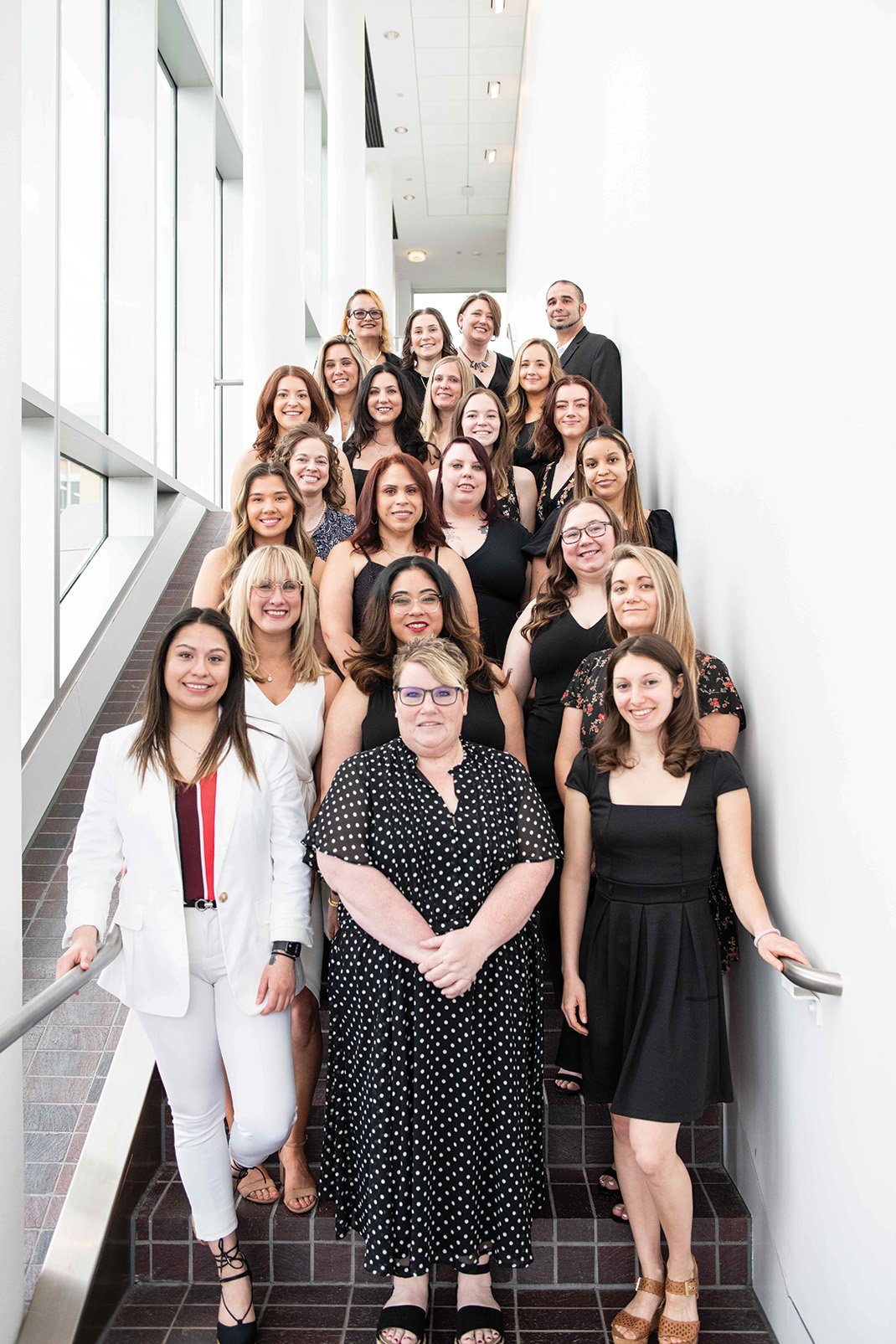
Reading Area Community College is Training Tomorrow’s Nurses
Nursing continues to be the largest profession in healthcare, offering various settings in which to practice along with specialty areas from which to choose. Research, administration, practice and education are focus areas for ongoing career advancement.
The nursing programs at Reading Area Community College (RACC) train students for a challenging career as a professional nurse where they can make a difference in the lives of others through highly qualified classroom instruction taught by experienced clinical faculty members. The programs also provide exceptional clinical experience at multiple leading healthcare institutions in Berks County.
The Reading Area Community College Associate Degree Nursing Program prepares students for entry-level nursing practice in any setting and to take the N-CLEX-RN examination. The RACC N-CLEX-RN pass rate is 94 percent: exceptionally high by healthcare industry standards.
Courses in nursing are enhanced with simulation and instructor–guided clinical experiences in a variety of medical-surgical and specialty practice settings. As an Accreditation Commission for Education in Nursing (ACEN)-accredited nursing program, RACC graduates who are granted Pennsylvania RN licensure are eligible for entry into all RN-BSN programs. Academic progression is encouraged and supported by RACC articulation agreements.
RACC offers two Associate Degree Nursing Program options to accommodate the busy lives of its students. The day program option provides classroom and patient care instruction during daytime hours. It encompasses four semesters over two years. Classroom instruction occurs two days per week (two to three hours per day), and patient care/lab experiences are two additional days per week. Patient care experience hours increase as a student works through the program.
The evening program option (beginning fall 2023) provides classroom and patient care instruction during evening hours. It encompasses seven semesters, including winter and summer sessions, over two years. Classroom instruction occurs two evenings per week (two to three hours per evening), and patient care/lab experiences are two additional evenings per week. Patient care experience hours increase as a student progresses in the program.
Students in both program options learn about the nursing process applied throughout the health-illness continuum, chronic, acute and critical care concepts across the lifespan, multiple clinical nursing skills and soft skills such as professionalism, leadership and communication.
The nursing programs also offer articulation agreements with multiple colleges and universities to allow for easy transfer of courses toward a bachelor's degree in Nursing.
To learn more about RACC training for a career in nursing, contact an enrollment specialist at admissions@racc.edu, 610.607.6224.
















